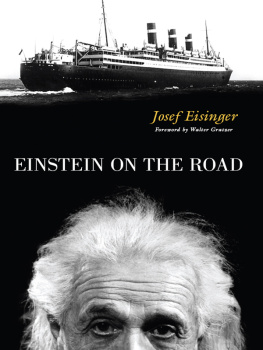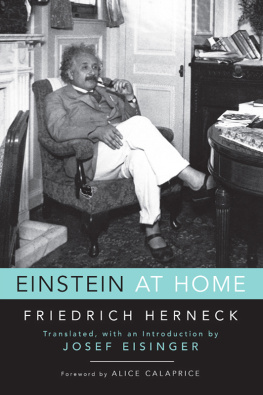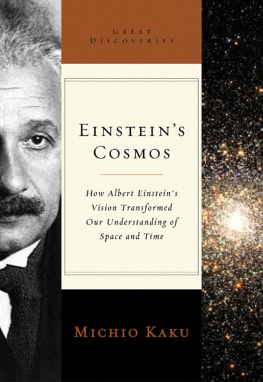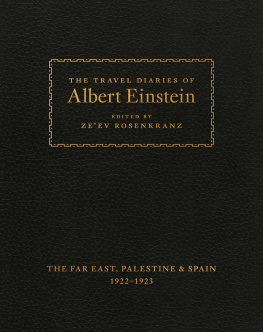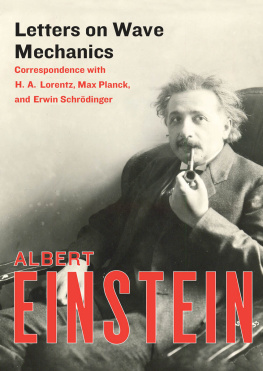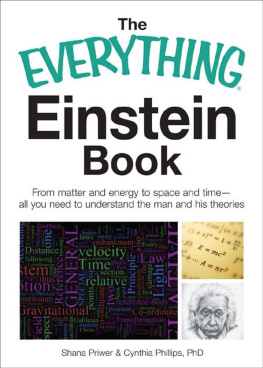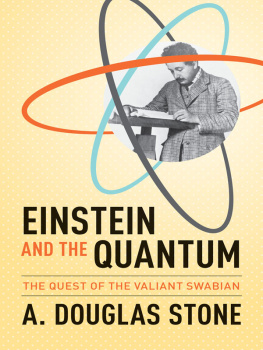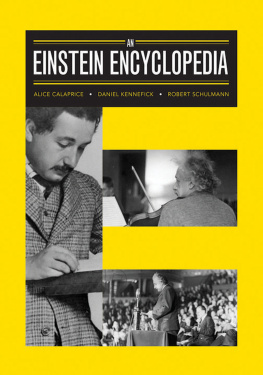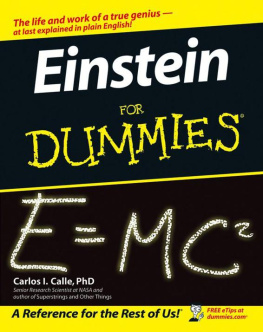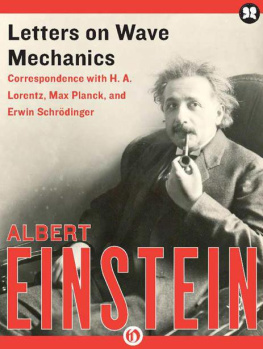
I am grateful to the Albert Einstein Archive, Princeton University Library, for allowing me access to the photocopies of Einstein's travel diaries, their transcripts, and to other Einstein material. I am equally indebted to the Einstein Archive, Hebrew University of Jerusalem, for its kind permission to include short quotations from the travel diaries in my narrative.
I thank the staff of the Bodleian Library, University of Oxford, for making the Deneke material used in available to me; Jenifer Glynn for allowing me to quote from her mother's letter; and Paul Kent for sharing with me his knowledge of Einstein in Oxford. Many thanks, also, to Freeman Dyson for telling me about Einstein's visit to Winchester College.
I am most grateful to Alice Calaprice for being my constant guide in the world of book publishing and the world of Einstein biographical research. I thank Andor Carius for his expertise, particularly regarding the Einstein-Tagore dialogues.
The unstinting help and advice of Linda Reganmy editorand of other members of the staff of Prometheus Books was much appreciated. Thanks to Will DeRooy for his careful and intelligent work in copyediting the manuscript.
I thank Walter Gratzer warmly for his critical reading of the entire manuscript and for sharing with me his inexhaustible store of knowledge of the history of science and scientists.
Finally, I am grateful to my wife, Styra Avins, for being accommodating toward my long preoccupation with Einstein and for her counsel in musical matters; I thank her, my daughter Alison, and my son Simon, for their loving support and skillful copyediting advice.


I n 1912, while Einstein occupied the chair for theoretical physics at Prague's German University, he visited Berlin for the first time. At that stage, he had already won wide recognition among physicists for his work in quantum physics and for his special theory of relativity, but he was by no means the celebrity he was to become in the 1920s. His weeklong stay in Berlin gave him an opportunity to meet with Max Planck, whom he greatly admired for having introduced quanta into physics, and with other renowned scientists then working in Berlin, Europe's preeminent center of physics research. But Einstein also used his visit for an affectionate reunion with his cousin Elsa Lwenthal, whom he had known since childhood. She had recently divorced and was now living in Berlin with her two teenage daughters.
Two years later, Einstein was offered a munificent academic position in Berlin, truly an offer he could notand did notrefuse. He consequently took up residence in the Prussian capital in 1914, arriving with his wife, Mileva, and their two young sons. But the marriage ended in acrimony soon after, and a few months later, the First World War broke out. Einstein's divorce did not become final until 1919, and when it did, he married Elsa. The couple established their household in Berlin, and the city remained their home until the Nazis came to power in January 1933. It was therefore as a Berliner that Einstein experienced the bleak years of World War I, their violent aftermath, and the bracing and turbulent years of the Weimar Republic, until its demise.
The present chapter sets the stage for Einstein's travel decade by reviewing the historical events that preceded it and by providing an outline of Einstein's earlier life and work.
BACKGROUND: WILHELMINE BERLIN
AND THE RUSH TO WAR
At the time of Einstein's visit to Berlin in 1912, the German Reich was just forty years of age. It had been assembled from numerous German principalities, most of them herded together under the dynamic leadership of Prussia, the Reich's most powerful member state. The emergence of a united Germany in 1871 represented the fruits of three victorious wars that Prussia waged against Denmark, Austria-Hungary, and France and also of the tireless diplomatic efforts of Prussia's prime minister, Count Otto von Bismarck. The newly created German state was nominally a constitutional monarchy, governed by a council, with limited input from an elected parliament, the Reichstag. In practice, however, most of the power was vested in the person of the kaiser, who was also king of Prussia, for the constitution gave him the authority to dismiss the governing council, as well as the Reichstag. Bismarck remained the Reich's guiding spirit from its inception until 1890, when he fell out with the newly anointed Wilhelm II. The new kaiser was by all accounts a vain and insecure young man who was not prepared to be overshadowed by his principal minister. The break came over a dispute regarding social policy, but its most profound effect was in foreign policy, for Wilhelm dismantled Bismarck's policy of negotiating interlocking alliances with the other great European powers as the means of ensuring Germany's security.
Wilhelm II put a more aggressive policy in place: he declined to renew the treaty with Russia that Bismarck had negotiated, and he was vociferous in his demands for a place in the sun for Germany alongside the European empires that were already in possession of the most desirable colonial real estate. Above all, Wilhelm was jealous of the global power exercised by Great Britain, which was ruled by his grandmother, Queen Victoria. He felt that his English relatives did not pay him the respect due to an emperor, and he was particularly envious of his uncle Albert, the Prince of Wales. He alienated Uncle Bertie by his boisterous behavior and poor sportsmanship during the Cowes regatta, that extravagant annual gathering that drew the cream of the European nobility to the Isle of Wight. It was in yacht racing that Wilhelm and Albert acted out their rivalry during the 1890s. Wilhelm even established his own grand regatta in Kiel, in an attempt to rival the Cowes regatta, but it was not a success. Queen Victoria tried hard to mend relations between the two ruling houses. She even offered her difficult
Perceiving Britain as a greater threat to Germany than Russia and France, Wilhelm ordered the rapid expansion of his Imperial Navy so that it might challenge the supremacy of the Royal Navy, Prince Albert's pride and joy. Admiral Alfred von Tirpitz was charged with building a powerful new battle fleeta provocation that Britain, with her many far-flung possessions, could hardly ignore. Britain responded by commissioning even faster, better-armed, and better-armored battleships, such as HMS Dreadnought, and Germany responded in kind. As the arms race between the two navies escalated, contemporary observers perceived it as a contest to decide who would rule the world.
On land, Wilhelm appointed Alfred von Schlieffen as army commander, to succeed Helmuth von Moltke, the celebrated hero of the Franco-Prussian War. Schlieffen's strategic plan for crushing France called for German armies to thrust west through Belgium before turning south, toward Paris, while employing a blocking force in the east to contain Russia. The plan recognized that a quick victory in the west was essential, since Germany could not win a protracted war. The Schlieffen plan was the strategic basis of the Triple Alliance of Germany, Austria-Hungary, and Italy, which was arrayed against the Entente powers: Britain, France, and Russia. Historians have offered many reasons for the nations' headlong plunge into war, but it cannot be denied that Wilhelm's personality flaws and his espousal of militaristic nationalism played a significant role. Einstein was, of course, thoroughly familiar with the history of Wilhelmine Germany, and nothing could have been more repugnant to his instinctive pacifism than the kaiser's policies.
Next page
